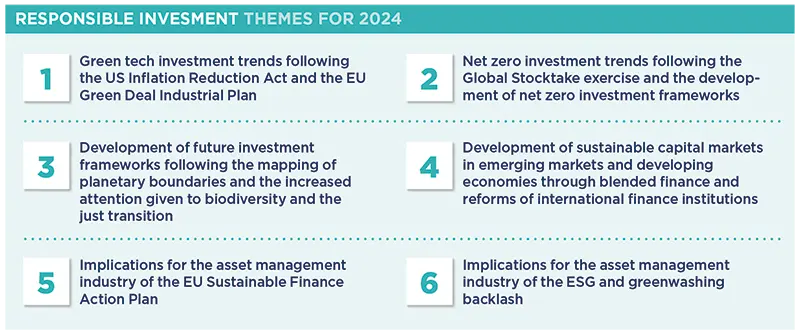Summary
Video: RI Outlook with Elodie Laugel
Responsible Investment views for 2024
Responsible Investing is moving from a niche to a standardised environment.
To reach the carbon neutrality objective by 2050, global clean energy spending has to increase to $4.5 trillion per year by 2030, with nearly half of this being dedicated to emerging markets. To support investments in clean energy infrastructure and technologies, the Inflation Reduction Act in the US and the Green Deal Industrial Plan in the EU aim to mobilise $400 billion in incentives and €300 billion in tax credits, respectively.
Sustainability issues will impact the economy, and our economic activities impact sustainability matters. Investors therefore need to address the investment context in a holistic manner to be profitable in the long run. While financial markets bear a higher level of complexity and uncertainty due to both the recent geopolitical and repeated extreme weather events, at Amundi we stand firm in our conviction that responsible investment delivers long-term value to our end-savers.
Despite challenging market conditions, responsible investment flows have continued to increase (see graph below) and there are several favourable numbers and trends that should support its future development:
- 67% of global asset owners are convinced of the materiality of ESG factors.
- Thematic and impact strategies are expected to dominate the market in 2024 and onwards (a shift driven by investors who not only prioritise financial returns but also measurable environmental and social impact).
At the same time, the successful, long-term decarbonisation of the economy will bring significant social challenges. Social, climate and biodiversity issues cannot be considered in isolation. For example, around 78 million jobs are estimated to disappear due to the transition to a low-carbon economy, replaced by 103 million jobs that workers must be trained for. Companies will increasingly be asked to prove their commitment to a just energy transition for all stakeholders: workers, suppliers, communities and consumers.
Decarbonising the economy requires coordinated action from all players.
It is also important to advance our understanding of the interconnected risks between climate change and biodiversity. “Planetary boundaries” is a concept that delineates the environmental limits within which humanity can safely operate and provides a compelling framework to assess issuers’ exposure to these interconnected risks.
As we look towards 2024, three main themes stand out for their implications on the responsible investment industry:
- The first Global Stocktake shows that global emissions have exceeded interim targets for meeting the 2050 objective of the Paris Agreement. To achieve the global objective of net zero, governments must issue and maintain more ambitious climate-related policies. Climate strategy has become an essential component of investors’ long-term risk management toolbox: an integrated net zero framework, embracing alignment and contribution dimensions, should be favoured by responsible investors. Tail risks stemming from both physical and transition risks should not be underestimated by investors.
- The success of the transition at a global scale depends on its success in emerging markets, as they are the regions most affected by climate change. Following on from China’s Belt and Road initiative, the US and EU have also launched their own infrastructure programmes focusing on low- and middle-income countries. However, public capital alone will not be sufficient. Blended finance appears to be an efficient solution to leverage public capital to de-risk private investments and channel private money where it is most needed.
- Responsible investing is quickly moving from a niche to a standardised and regulated environment. To face the environmental and social challenges of today’s economy, it is key to increase transparency related to investors’ commitments and bring greater clarity to our value proposition. In the EU, we are convinced that to achieve its objective of financing the transition through individual choices, the Sustainable Finance Action Plan should:
- Provide clarity in the range of sustainable finance offerings, to ensure comparability and comprehensiveness for end investors
- Tailor sustainable finance offerings to the needs of end investors, to ensure savings are not restricted to a niche sector.
To conclude, successfully decarbonising the economy requires urgent and coordinated action from all players, including from the financial industry. The coming years are crucial if we want to avoid huge financial, environmental and social costs in case of a delayed or not successful transition, and make the most of the massive financial, environmental and social opportunities a steady and orderly transition can gift us with. All investors should stay the course.

Energy transition in focus

Amundi RI Views for 2024 and beyond

Explore our 2024 Investment Outlook
With special thanks for the support to:
Jean-Jacques Barbéris, Head of Institutional and Corporate Clients Division & ESG
Vincent Mortier, Group Chief Investment Officer
Monica Defend, Head of Amundi Institute
With the contributions of:
Isabelle Charles
Sylvia Chen
Carine Chouchana
Jordi Debrulle
Florent Deixonne
Edouard Dubois
Joan Elbaz
Julien Foll
Grace Guan
Patrick Haustant
Yasunori Iwanaga
Mathieu Jouanneau
Tegwen Le Berthe
Theo Le Guenedal
Caroline Le Meaux
Sara Lovisolo
Aaron Mcdougall
Molly Minton
Yannic Raulin
Angge Roncal Bazan
Thierry Roncalli
Sofia Santarsiero
Alexis Sciau
Takaya Sekine
Andreas Steinert
Craig Sterling
Luda Svystunova
Theophile Tixier
Kristy Wong





